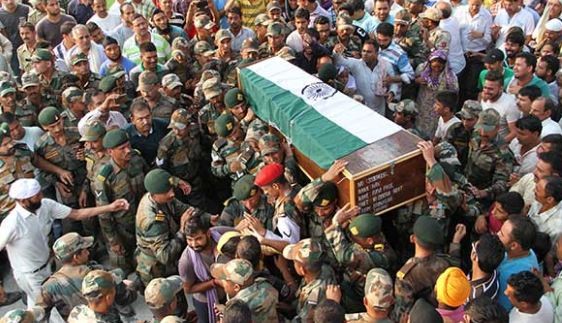The government of Indian Prime Minister Narendra Modi will definitely respond forcefully to Sunday's attack by Kashmiri Muslim militants on an Indian Army base in Kashmir but the choice seems to lean more towards diplomatic rather than military action.
Indian media is reporting a lively debate among Cabinet officials for and against taking some form of punitive military action against Pakistan for this country's alleged role in masterminding the attack that killed 18 Indian jawans or Indian soldiers.
The army said the assault on its base at Uri had the trademark of Pakistan-based militant group Jaish-e-Mohammed. It claims weapons and other equipment seized from the four dead Muslim militants that carried out the gun and grenade attack had Pakistani markings.
No Kashmiri Muslim militant group has claimed responsibility for the deadly strike, however.
The army immediately accused Pakistan of being behind the attack. General Dalbir Singh Suhag, Chief of the Army Staff (COAS) of the Indian Army, toured army units in Kashmir only a few days before the attack as part of Operation Calm Down.
Gen. Singh said India has "the capacity to react to such blatant acts of aggression and violence," adding "we reserve the right to response to any act of the adversary at the time and place of our own choosing."
Lt. Gen. Ranbir Singh, Director General, Military Operations, said evidence gathered at the scene indicated the attackers were foreign and their equipment bore Pakistani markings.
"Our men are ready to give a befitting response," said Gen. Singh without explaining what this exactly meant.
Prime Minister Narendra Modi strongly condemned the "cowardly terror attack".
"I assure the nation that those behind this despicable attack will not go unpunished," Modi said in Twitter posts.
Despite the tough talk, Delhi might not have a viable military option that will risk an all-out war against Pakistan, said some analysts. India's best course of action is to rally the world against Pakistan's alleged state-sponsorship of terrorism targeting India.
India said it will launch a diplomatic offensive against Pakistan and step up pressure to isolate Pakistan at international gatherings. It will likely raise the Kashmir attack at the United Nations General Assembly when Kashmir comes up on the agenda.
"To do anything, we must think with a cool mind, consider it properly and work according to a strategy," said junior foreign minister, retired former general Vijay Kumar Singh. Gen. Singh was COAS preceding Gen. Dalbir Singh.
Defense analyst Rahul Bedi said "military options are not only restricted, I think they are virtually non-existent."
Pakistan makes a distinction between good terrorists (or those it uses as an instrument of state policy such as the Lashkar-e-Taiba and Jaish-e-Mohammed against India) and bad terrorists such as the Pakistani Taliban responsible for unrelenting attacks on Pakistani soil.
Pakistan has also called the UN to investigate alleged human rights abuses by Indian security forces in Indian-administered Kashmir, which has been hit with street protests that have killed nearly 80 people over the past two months.



























